Movie Review – Moonstruck
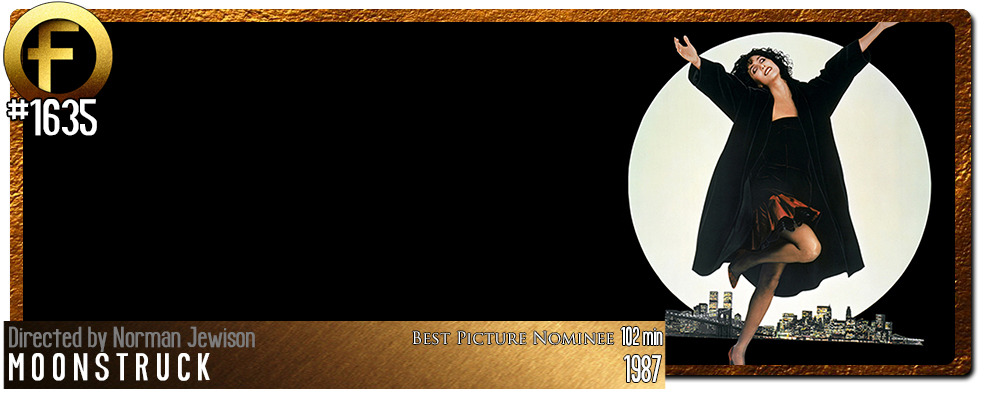
Principal Cast : Cher, Nicolas Cage, Olympia Dukakis, Vincent Gardenia, Danny Aiello, Julie Bovasso, Louis Guss, John Mahoney, Feodor Chaliapin Jr, Anita Gillette.
Synopsis: Loretta Castorini, a bookkeeper from Brooklyn, New York, finds herself in a difficult situation when she falls for the brother of the man she has agreed to marry.
********
Few films manage to capture the lustre of romance and the human condition to perfectly as Moonstruck. It’s one of those rare examples where the story, characters and performances all manifest into a masterclass of subgenre perfection, as close to faultless as cinema could ever hope. Led by the brilliant work of Cher, as well as a manic Nicolas Cage in his early, youthful brackishness, and backed by a superlative supporting cast (including Olympia Dukakis, always a favourite of mine), Moonstruck’s lunar-themed mystique has not diminished with time and remains as perspicuous now as it did some thirty years ago.
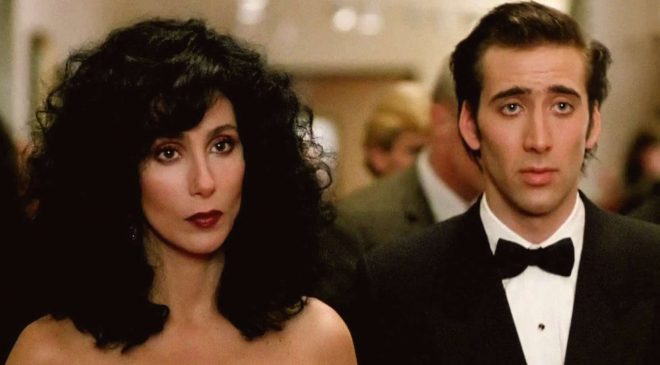
Cher plays Loretta Castorini, a widow living with her parents, plumber Cosmo (Vincent Gardenia) and Rose (Dukakis), who becomes engaged to the whimpering Johnny Cammareri (Danny Aiello), before he rushes off to be with his dying mother in Sicily. Left to plan the wedding, Loretta is asked to contact Johnny’s estranged brother Ronny (Cage) and request he attend the wedding; instead, Loretta and Ronny begin a whirlwind romance that leads her to question marrying Johnny. Meanwhile, Cosmo is nefariously seducing with another woman, Mona (Anita Gillette), while Rose finds the affections of a local college lecturer, Perry (John Mahoney) within the loneliness of her marriage.
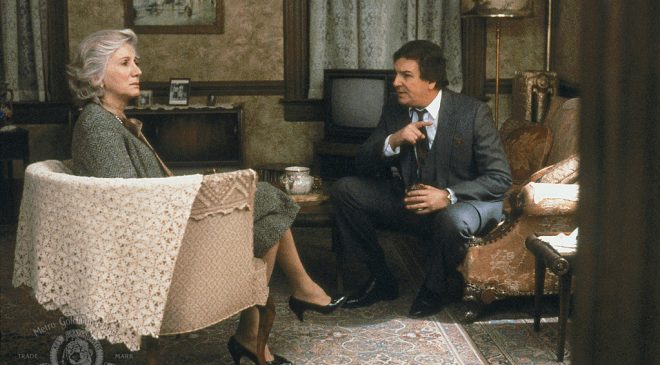
Strong writing (screenwriter John Patrick Shanley snagged an Oscar for his script), strong acting (Cher and Dukakis both grabbed Oscar for their performances) and a charming sense of comedic timing by director Norman Jewison coalesce to give Moonstruck its delicacy. It’s a film of both biting prejudicial satire and elegantly sweaty romance, a bizarre concoction of shouting families and wicked glints of love that works through Jewison’s Brooklyn-set lensing. Shanley’s script is a delight of histrionics and passion – that’s the film’s core, passion – replete with characters that feel lived in an worn (different from worn out, mind), making them feel like we ought to know them. Audience investment in Loretta’s fate, with her blustering conviction that she’s “cursed” thanks to her late husband’s untimely demise, is echoed in the similarly cursed Cammareri family, with Ronny’s entire sense of self wrapped up in his lost hand – apparently he suffered an accident with a grinder and his own fiancée left him soon afterwards – and the idea that these people are in some manner broken and need fixing. The film’s ensemble works as a family drama of sorts, the subplot involving Gardenia’s Cosmo dallying with another woman and Dukakis’ Rose trying to understand why men would cheat on their wives edifying the ongoing human experience in which this continues.
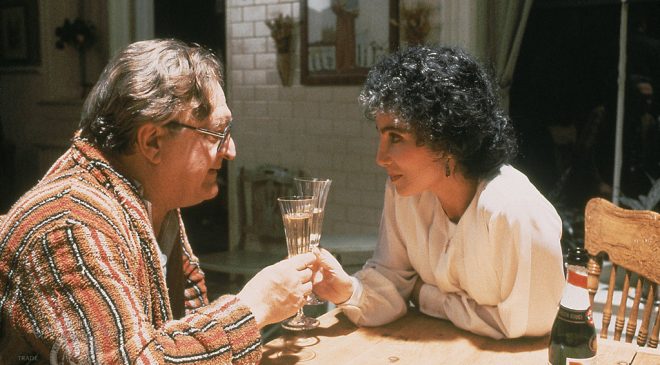
Cher’s career on the screen skyrocketed in the 1980’s, following landmark turns in both Silkwood (1983) and Mask (1985) giving her serious acting credibility. 1987 became her year, appearing in three commercially successful films including Moonstruck (the others being Suspect and The Witches of Eastwick), and it would culminate in the actress winning the Oscar for a Lead Female Performance in this movie. Cher’s portrayal of Loretta is one for the ages: feisty, determined, modern and a touch overly-dramatic, Cher’s range in bringing the character to the screen benefited the already sparkling dialogue but also her chemistry with co-star Nic Cage. Cage, for his part, also had a blockbuster decade between 1985 and 1995, not the least being his work here, which is – to use the phrase often circulated online – absolutely Going Full Cage in its manic, frenzied best. Cage’s wild-eyed performance here might feel like a precursor to his now meme-worthy career but that the time it was considered quite effective, and in truth the role does demand a little bit of crazy to really work. Cage’s hysterical lament beneath his family’s bakery about his estrangement from Johnny and his passion for his former fiancée and his bitterness about his mangled hand form the perfect introduction to the antithesis of Loretta’s own form of madness. Together they really do make the perfect couple.
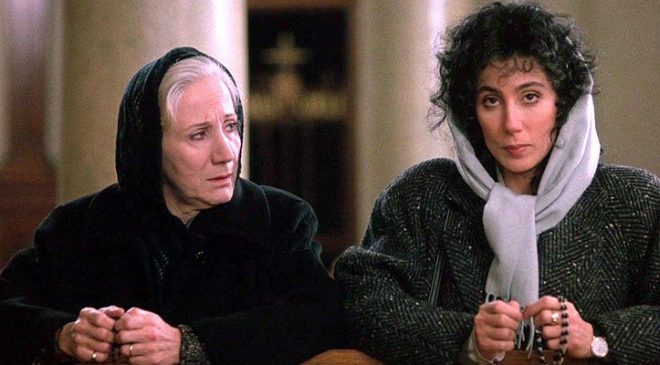
While the limelight for acting might have been stolen by the film’s younger cast and Dukakis’ matriarchal performance, I’ve slowly come around to thinking more highly of Vincent Gardenia’s work as Rose’s philandering husband. It’s a role not easily accomplished with grace, that of a cheating husband, but Gardenia brings a sly wit and masculine garrulousness to the part that makes it… I hesitate to use the word charming in describing a cheater, but hey, it is what it is. Gardenia’s gruff exterior and Italian-American demeanour (talking with his hands, utter misogyny and a total disdain for propriety in many cases) makes him something of a villain without actually being a villain, with Jewison’s direction turning him into a bit of an emasculate schmuck. While Cher and Dukakis and Cage could rightly bask in the plaudits coming their way, by my estimation it’s Gardenia who inexorably becomes the film’s most valuable component. At least in terms of plot propulsion and driving the subtext of love and romance in a world of philandering men. He takes a predictably stock character and turns him into an actual person of interest, which surprised me on a recent re-watch.
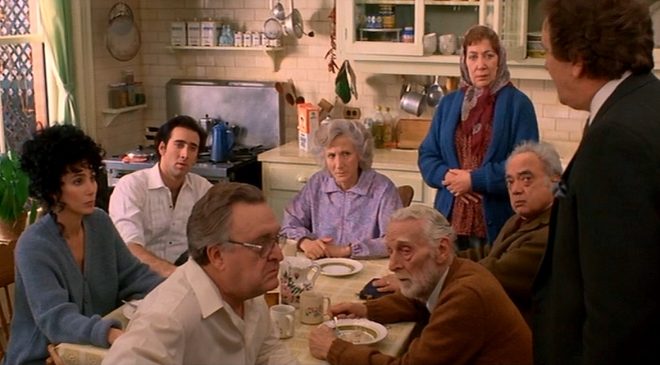
Moonstruck is a glimmering example of all facets of film-making combining to create a genuinely masterful work of art. It’s funny, romantic, dramatic, subversive with its statements about human relationships, but most of all it’s accessible. The film’s romantic aspects aren’t saccharine or played for cheap gags, the more serious elements of Shaney’s script bubble with modern angst, and the comedy evolves with intelligence. There’s a lot of love in this movie, just as there is a lot to love about this movie. Its appeal is timeless, its writing is crisp and meaningful, and the performances anchor a rock-solid family comedy-drama that has an almost eternal resonance; bella luna!

